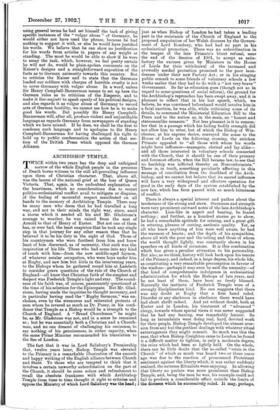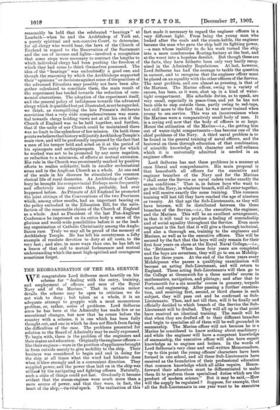ARCHBISHOP TEMPLE. T WICE within two years has the deep and
unfeigned sorrow of the whole English people in the presence of Death borne witness to the still all-prevailing influence upon them of Christian character. That, above all, was the lesson of the national grief at the loss of Queen Victoria. That, again, is the undoubted explanation of the heartiness, which no considerations due to recent politico-ecclesiastical conflict avail to mitigate or disguise, of the feeling of mournful respect manifested on all hands to the memory of Archbishop Temple. There may be many men who deem that he had travelled a long way, and not to their minds the right way, since, amid a storm which it needed all his and Mr. Gladstone's courage to weather, he was raised from the seat of Arnold. to that of Henry of Exeter. But not one of them has, or ever had, the least suspicion that he took any single step in that journey for any other reason than that he believed it to be his duty in the sight of God. Those of his countrymen who were furthest from him and knew least of him discerned, as of necessity, that such was the inspiration of his life. Those who had come into any kind of touch with him—from the now middle-aged laymen, of whatever secular occupation, who were boys under him at Rugby, and saw him but little in the intervening years, to the Bishops whom he gathered round him at Lambeth to consider grave questions of the rule of the Church of England—all knew that Christian faith of the simplest and deepest was Frederick Temple's light and stay. The sound- ness of his faith was, of course, passionately questioned at the time of his selection for the Episcopate. But Mr. Glad- stone, having made the inquiries he thought necessary, and in particular having read the "Rugby Sermons," was un- shaken, even by the strenuous and reiterated protests of men whom he revered as much as Dr. Pusey, in his confi- dence that Temple as a Bishop would be a strength to the Church of England. A "Broad Churchman" he might be, as Mr. Gladstone was not, and in a sense he remained so ; but he was essentially both a Christian and a Church- man, and no one dreamt of challenging his eminence, to say nothing of his genuineness, in either capacity, when the same Prime Minister recommended his translation to the See of London.
The fact that it was in Lord Salisbury's Premiership that, twelve years later, Bishop Temple was elevated to the Primacy is a remarkable illustration of the smooth and. happy working of the English alliance between Church and State. To those who are tempted to think that it involves a certain unworthy subordination on the part of the Church, it should be some solace and refreshment to recall the absolute frankness with which Archbishop Temple from time to time thought it right to criticise and oppose the Ministry of which Lord Salisbury was the head, just as when BiShop of London he had taken a leading part in the resistance of the Church of England to the proposed amputation of her Welsh dioceses by the Govern- ment of Lord Rosebery, who had had no part in his ecclesiastical promotion. There was no subordination in the temper of the late Primate's blunt refusal, near the end of the Session of 1901, to accept as satis- factory the excuses given by Ministers in the House of Lords for their withdrawal of the increased and avowedly needed protection promised to the poor laun- dresses under their new Factory Act ; or in his stinging public remark to some friends of voluntary schools a few weeks earlier that they had to do with a "not very brave" Government. So far as education goes (though not so in regard to some questions of social reform), the ground for the Archbishop's reproaches has been swept away, and it is pleasant to reflect that in his last speech, which, we believe, he was convinced beforehand would involve him in a fatal exertion, he was able, while criticising some of its details, to commend the Ministerial Education Bill to the Peers and to the nation as, in the main, an "honest and statesmanlike measure." Not less pleasant is it to remem- ber that in a passage which his failing bodily strength did not allow him to utter, but of which the Bishop of Win- chester, at his express desire, conveyed the sense to the House of Lords on the following evening, the stricken Primate appealed to "all those with whom his words might have influence—managers, clerical and lay alike— and all those interested in voluntary schools connected with the Church, that it should be one of their primary and foremost efforts, when the Bill became law, to see that no hardship was inflicted thereby on Nonconformists." There is, in truth, something peculiarly affecting in this message of conciliation from the deathbed of the Arch- bishop, and we cannot but believe that its sacred influence will have a very widespread and effective operation for good in the early days of the system established by the new law, which has been passed with so much bitterness of conflict.
There is always a special interest and pathos about the tenderness of the strong and stern. Sternness and strength were very prominent outward notes of the late Archbishop's character. Lion-like in aspect and bearing, he feared nothing ; and further, as a hundred stories go to show, he had a remarkable aptitude for coining, and a great gift in uttering, phrases of cutting, sardonic quality. Yet, as all who knew anything of him were well aware, he had the warmest of hearts ; and the depth of his sympathies, above all with the poor and the toiling and those of whom the world thought lightly, was constantly shown in his speeches on all kinds of occasions. It is this combination which has given a peculiar attraction to his personality. But also, as we think, history will look back upon his tenure of the Primacy, and indeed, in a large degree, his whole life, as constituting a very remarkable presumption in favour of the wisdom—perhaps it may even be said the necessity—of that kind of comprehensive indulgence in ecclesiastical administration for which the Bishops of late years, and. he not least of them, have been so freely blamed. Naturally the instincts of Frederick Temple were of a strongly disciplinarian kind. No one suggests that there was any doubt at Rugby that a firm hand ruled. Disorder or any slackness in obedience there would have had short shrift indeed. And yet without doubt, both at Exeter and in London, his treatment of " advanced" clergy, towards whose special views it was never suggested that he had any leaning, was remarkably lenient. So long as incumbents were doing real, hard, devoted work for their people, Bishop Temple developed. the utmost aver- sion from any but the gentlest dealings with whatever ritual extravagances they might commit. So much was this the case, that when Bishop Creighton came to London he found it a difficult matter to tighten, in only a moderate degree, the reins which had been so lightly held. On the whole, there can be little doubt that the so-called "crisis in the Church" of which so much was heard two or three years ago was due to the reaction of pronounced Protestant sentiment against the liberty which, it was rather suddenly realised, the extreme Ritualists were enjoying. In allowing that liberty no prelate was more prominent than Bishop Temple, and, being the man he was, his example could not fail to produce a considerable effect outside the limits of the dioceses which he successively ruled. It may, perhaps, reasonably be held that the celebrated " hearings " at Lambeth—when he and the Archbishop of York sat, a purely spiritual and non-coercive Court, to determine, for all clergy who would hear, the laws of the Church of England in regard to the Reservation of the Sacrament and the use of incense and lights—involved a recognition that some steps were necessary to contract the lengths to which individual clergy had been pushing the freedom of which they had come to think themselves possessed. The idea of the "hearings" was undoubtedly a good one, and though the reasoning by which the Archbishops supported their" opinions "or decisions against some of thepractices of the advanced Ritualists may possibly not have been alto- gether calculated to conciliate them, the main result of the experiment has tended towards the reduction of cere- monial aberrations. The adoption of the experiment itself, and the general policy of indulgence towards the advanced clergy which it qualified butyet illustrated, must be regarded, we think, as exemplifying the late Primate's deliberate conviction that a very wide comprehensiveness was essen- tial towards clergy holding views not at all his own if the Church of England was to be held together, and further, that if the unity of our Church could be maintained there was no limit to the splendour of her mission. On both these points we believe that history will justify Archbishop Temple's main view, and will be profoundly impressed by the fact that a man of his temper held and acted on it at the period of his episcopate and archiepiscopate. The unity for which he worked was not to be promoted by any mere negation, or reduction to a minimum, of efforts at mutual extension. His rule in the Church was prominently marked by positive efforts to realise solidarity, both in smaller ecclesiastical areas and in the Anglican Church as a whole. At one end of the scale in his dioceses he stimulated the common clerical life of rural deaneries. As Archbishop of Canter- bury he brought his comprovincial Bishops more frequently and effectively into concert than, probably, had ever happened before. As Primate of All England he promoted the joint sittings of the Convocations of the two Provinces which, among other results, had an important bearing on the policy embodied in the Education Bill, for the satis- faction of the reasonable claims of the Church of England as a whole. And as President of the last Pan-Anglican Conference he impressed on its entire body a sense of the glorious and world-wide possibilities before it as the lead- ing organisation of Catholic Christianity among the Anglo- Saxon race. Truly we may all be proud of the memory of Archbishop Temple. He has left his countrymen a lofty example of resolute devotion to duty at all costs, to the very last ; and also, in more ways than one, he has left us lesson of that call to mutual forbearance and mutual understanding which the most high-spirited and courageous sometimes forget.







































 Previous page
Previous page